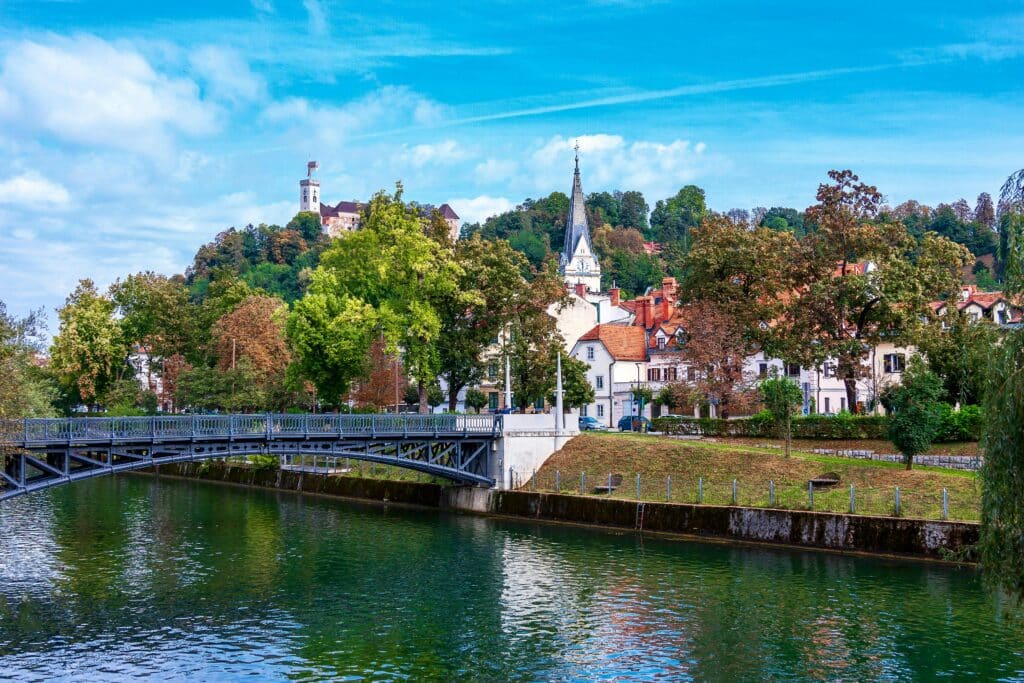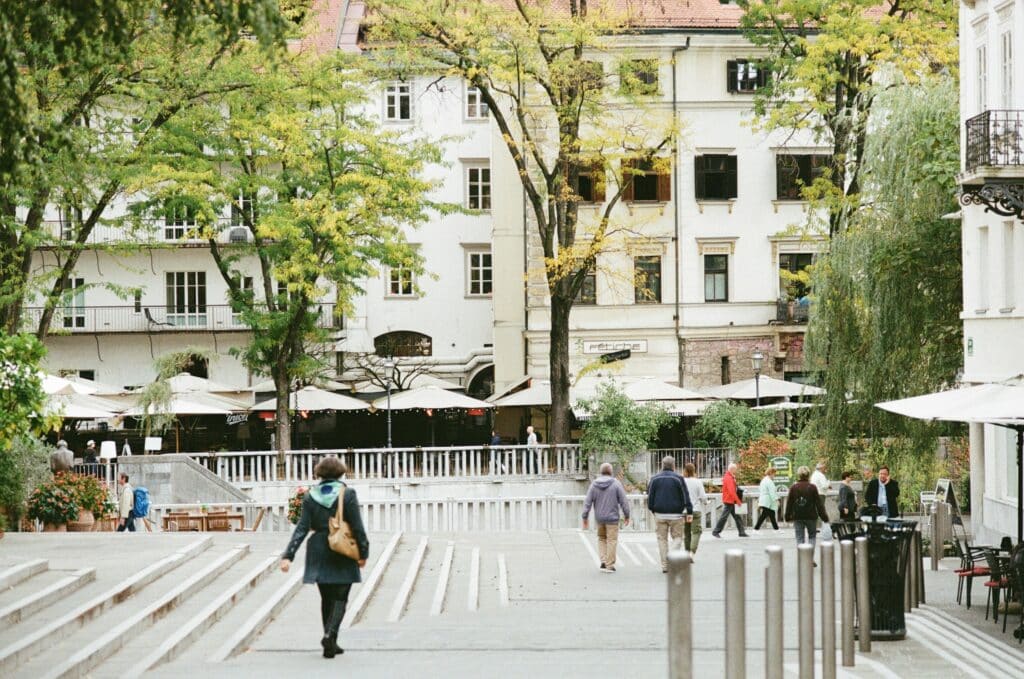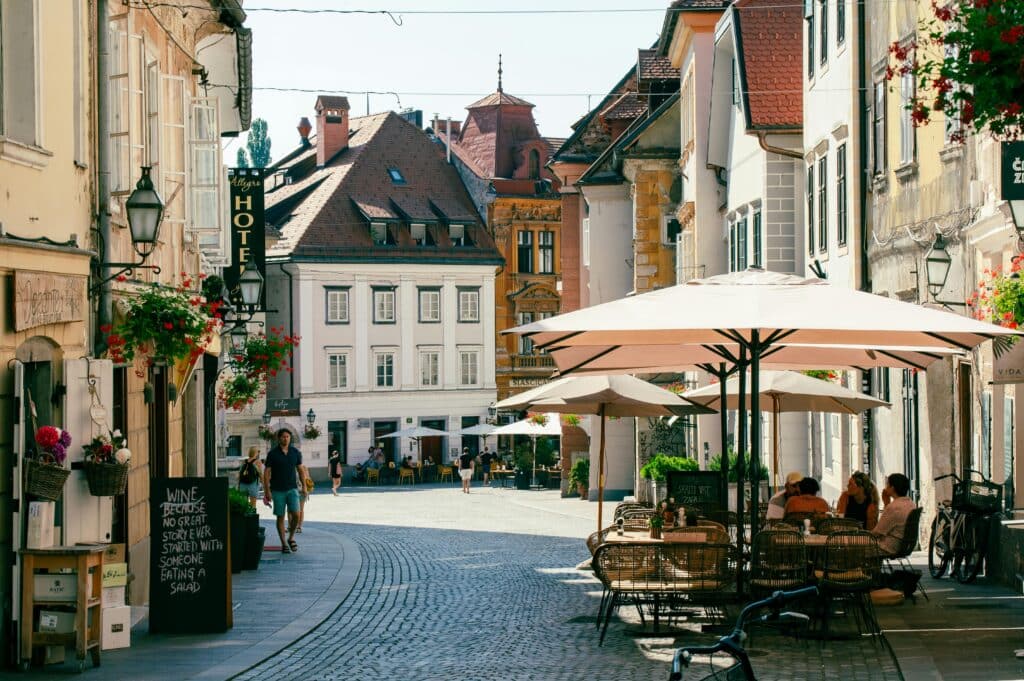
The Slovenian capital of Ljubljana is a picturesque and charming city set between the Alps and the Adriatic Sea. Like much of the European continent, its rich, varied history has helped to make it a vibrant and attractive place to live in all kinds of ways.
If you’re considering making the switch to Slovenia, this Remitly guide is packed with all you need to know to settle in seamlessly, including practical advice, insights, and tips for everyday life in Ljubljana.
Table of Contents
| Essential Facts about Nantes | |
| Population | 300,000 |
| Language | Slovene (official); English is widely spoken |
| Currency | Euro (€) |
| Popular neighborhoods | City Center (Staro Mesto), Šiška, Vič, Bežigrad |
| Average rent for a one-bedroom apartment | 450 – 1200 EUR / month |
| Top industries | Technology, tourism, education, and manufacturing |
Understanding Ljubljana
As a former state of Yugoslavia, Ljubljana has a turbulent history. But nowadays, Slovenia’s largest city is a bustling cultural, economic, and political hub.
Its more ancient past is deeply intertwined with the Roman, Austrian, Hungarian, and Italian influences, which have shaped its identity over the centuries. This is clear to see in the central old town. A mix of baroque and art nouveau architecture lines narrow cobbled streets, with charming cafes running along the Ljubljanica River.
Neighborhoods and rental prices
Ljubljana’s different neighborhoods offer something for everyone:
- City Center (Staro Mesto): Living in the city center places you in the heart of the action, close to major attractions like Prešeren Square, the Ljubljanica River, and a variety of cafes and street food markets. Rent in this area is higher, with one-bedroom apartments costing between €800 and €1,200 per month.
- Šiška: Located north of the city center, Šiška is a residential area popular with both locals and expats. It offers a quieter atmosphere, with plenty of green spaces like Tivoli Park. Rent here ranges from €500 to €800 for a one-bedroom apartment.
- Vič: Sitting right near the university, this is a popular area among students and academics. It’s a vibrant neighborhood with a variety of affordable dining options and a lively cultural scene. Rental prices are slightly lower, with one-bedroom apartments ranging from €450 to €700.
- Bežigrad: A mix of modern apartments and green spaces makes Bežigrad an ideal choice for families. It offers easy access to amenities and has a strong community feel. Rent in Bežigrad is comparable to Šiška at €450 to €700.
Resources for finding housing:
- Nepremicnine.net: Slovenia’s most popular real estate website
- Bolha.com: a large general classified ads website that includes rentals
- Local Agencies: Sure, everything is online these days, but local real estate agencies can assist with finding both short-term and long-term rentals, as well as purchasing property.
Public transport in Ljubljana
As a relatively small European city, Ljubljana is known for its compact nature and efficient public transportation system, making it easy to move around.
The city’s public transport is managed by Ljubljanski potniški promet (LPP), which operates an extensive bus network. The Urbana Card is essential for using the city’s buses and can be purchased at kiosks, post offices, and LPP offices.
- Rush hour: Expect buses to be crowded during peak hours, typically from 7:30 to 9:00 a.m. and 4:30 to 6:00 p.m.
- Urbana Card: Single journeys are valid for 90 minutes, no matter how many buses you take. (You can use an ordinary contactless payment card on the buses, but if you change buses, you will be charged again.)
- A single ride costs €1.30, and monthly passes are available for those who commute regularly.
Driving and cycling
If you plan on driving in Slovenia, you’ll need to exchange your foreign driver’s license for a Slovenian one after six months of residency. The process involves a medical exam and some paperwork, but it’s generally straightforward and shouldn’t require a driving test.
Alternatively, why not travel by bike? Ljubljana is a bike-friendly city with numerous cycle lanes. If you don’t have your own ride, the BicikeLJ bike-sharing system provides a convenient and cost-effective way to get around.

Essential services and amenities
Ljubljana is a fast-developing, modern city that offers its residents top-quality facilities in every sense. Here’s a quick rundown of the essentials:
Healthcare
The main hospitals in Ljubljana are the University Medical Center and the Community Health Center. Slovenia has a fantastic public healthcare system and residents enjoy free coverage for the majority of basic medical services, including emergency treatment and general care.
However, expats often opt to take out additional private health insurance policies to guarantee more comprehensive coverage and enjoy services provided in English.
Utilities
In what is an increasingly digitized society, setting yourself up with utilities like electricity, water, and the internet is usually straightforward. Many rental agreements include these basics in the price, but if you need to set them up independently, these are the biggest providers:
- Elektro Ljubljana (electricity)
- Telekom Slovenije (internet & phone)
- Butan Plin (gas)
Banks
A local bank account is very useful if you’re going to be living in Ljubljana for any length of time. Luckily, opening one is not a strenuous process and all you’ll need is your passport, proof of residence, and a tax number.
Major banks such as NLB and SKB Banka offer services in English and have branches throughout the city. They also allow you to sign up for an account online!
Cost of living
As European capitals go, Ljubljana is not expensive. Of course, different lifestyles will demand different expenses, but things like groceries, transport and eating out are all moderately priced.
As is usually the case, rent is the single greatest expense. Including housing, a single person’s monthly bills might range from €1,200 to €1,500. A family can typically get by in the city on between €2,500 to €3,500.
Taxes in Slovenia
Residents of Slovenia are subject to local taxes on their worldwide income. Consulting with a tax advisor is always a wise idea for people who have moved from abroad, helping to ensure compliance with Slovenian tax laws.
If you’re working in the country, your employer will typically handle any tax deductions. However, a general understanding of the tax system is important so you avoid any penalties — this is vital if you think you might want to apply for permanent residence or citizenship one day.
Social life in Ljubljana
Building a social network and integrating into the local community are essential if you’re going to feel at home in Ljubljana. Meeting new people can be the hardest part of moving to a new place, but one of the advantages of being in a capital city is that you’re never on your own!
Joining clubs or attending meetups is a great way to meet both locals and other expats. Platforms like Internations and Meetup.com are great for finding social events, while language exchange platforms like Tandem can help you find local groups to practice your Slovene.
Entertainment and dining
Ljubljana’s food scene is booming. From traditional Slovenian dishes to international cuisine, there’s something to cater for every taste. Odprta kuhna (Open kitchen) is an awesome weekly food market. It showcases a broad range of street food options and is the perfect introduction to Slovenian cuisine.
For nightlife, head to the vibrant Metelkova neighborhood, known for its bars and clubs, or you can always enjoy a more relaxed evening at one of the city’s beautiful riverside cafes.
Cultural and recreational activities
Ljubljana is a city rich in cultural activities, home to numerous museums, galleries, and theaters.
- Iconic landmarks: Ljubljana Castle — accessible via a funicular — and the Triple Bridge are the work of renowned architect Jože Plečnik, whose influence is evident throughout the city, from Prešeren Square to the distinctive Dragon Bridge.
- Outdoor activities: Tivoli Park is a great spot for a day out with the family. For those looking for a more serious hike, a day trip to the nearby Julian Alps offers some breathtaking trails.
- Festivals: The city hosts a number of events throughout the year, from the famous Ljubljana Summer Festival to the prestigious Slovene Wine Festival.
The city’s central location in the country also makes it an ideal base for exploring the rest of Slovenia and beyond, with Lake Bled, and Postojna Cave just a short drive away.
Beyond that, the proximity to Italy, Austria, Hungary, and Croatia means that a weekend getaway to Venice, Vienna, Zagreb, or Budapest is easily within reach.

Working and studying in Ljubljana
Ljubljana is a growing hub for technology, education, and tourism, making it an attractive city for both work and study.
The job market
The job market in Ljubljana is competitive, particularly in sectors like technology, engineering, and tourism. Major employers include multinational companies as well as local startups.
LinkedIn is always a good port of call if you’re looking for a job, but local portal Mojedelo.com is full of offers based in Slovenia’s capital.
Salary expectations
Salaries in Slovenia vary widely depending on the industry and your level of experience. The average gross monthly salary in Ljubljana is around €1,800, but this can be significantly higher in specialized fields like IT or engineering.
Higher education
Ljubljana is home to several universities, including the country’s most prestigious, the University of Ljubljana. It is also home to numerous language schools offering courses in Slovene, English, French, German, and more.
If you’re interested in studying in Slovenia, you’ll need to apply for a student visa, which requires proof of enrollment and financial means.
Practical tips for newcomers
Ljubljana is a safe city with a low crime rate, but it’s always wise to stay vigilant, especially in crowded tourist areas. Keep an eye on your belongings and avoid poorly lit areas at night.
Slovenians are known for their politeness and punctuality. A firm handshake and direct eye contact are common when greeting someone, and much appreciated by the locals. It’s also customary to remove your shoes when entering someone’s home.
Useful resources:
Visit Ljubljana: The official tourism website offers information on events, attractions, and services in Ljubljana.
eUprava Portal: Slovenia’s official government services portal lets residents and citizens access various services online without needing to visit physical offices — a real time-saver!
Urbana App: Essential for navigating Ljubljana’s public transportation.
Expats in Slovenia: Pop into this large and regularly updated Facebook group where you can connect with other expats for advice and support.
Moving to Ljubljana offers an incredible opportunity to experience life in one of Europe’s most charming European capitals.
For more insights on living abroad, be sure to explore the other helpful articles on the Remitly blog.
FAQ
Yes, Slovenia is a great place to settle, offering high living standards, beautiful landscapes, and proximity to countries like Switzerland, Croatia, and the Balkans. The country is safe, with good healthcare and education.
Ljubljana is excellent for expats, providing a mix of Slavic culture and Western European amenities. It’s walkable, with good public transport and an international community. Many enjoy its charming squares, like Trg Republike — the perfect place to enjoy a walk and an ice cream in the evening.
Americans can live in Slovenia by obtaining a residency permit, typically for work, study, or retirement. Slovenia’s location in the Balkans makes it ideal for travel.
Ljubljana is a moderately priced city. It’s cheaper than cities in many other European countries like Switzerland or Austria, but more expensive than most Croatian cities. Housing, dining, and domestic Slovenian wines are all reasonably affordable.
Life in Slovenia is peaceful, surrounded by nature and mountains, with vibrant cities like Maribor and Ljubljana offering a rich cultural scene.
Life in Ljubljana is relaxed, with a mix of historical charm and modern skyscrapers. People enjoy walking tours, friendly cafes, and green spaces.
Life in Ljubljana is relaxed, with a mix of historical charm and modern skyscrapers. People enjoy walking tours, friendly cafes, and green spaces.
